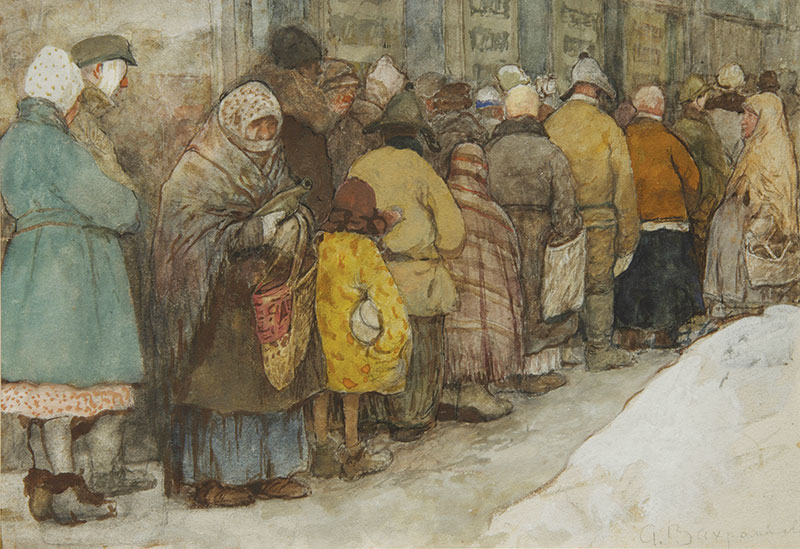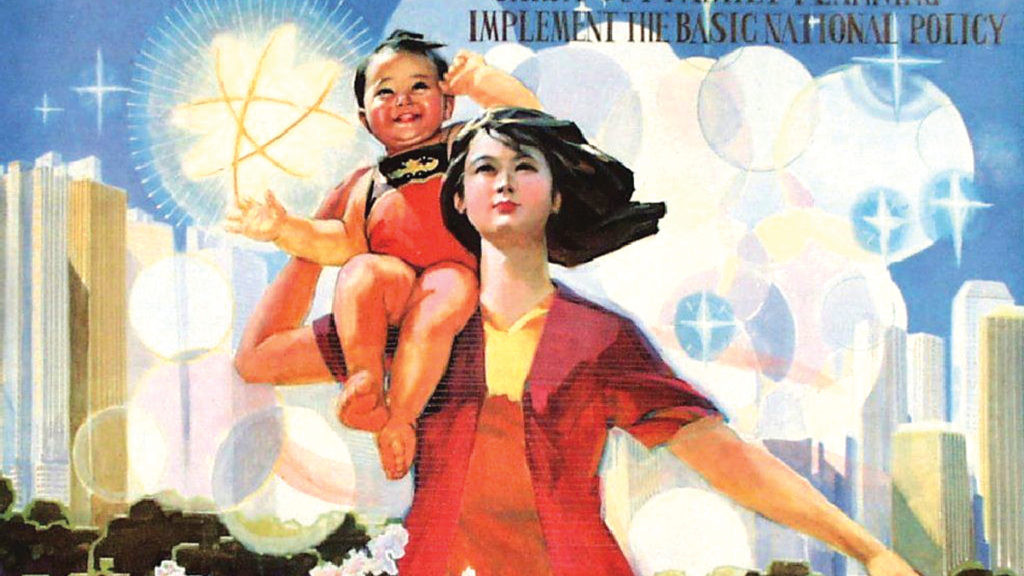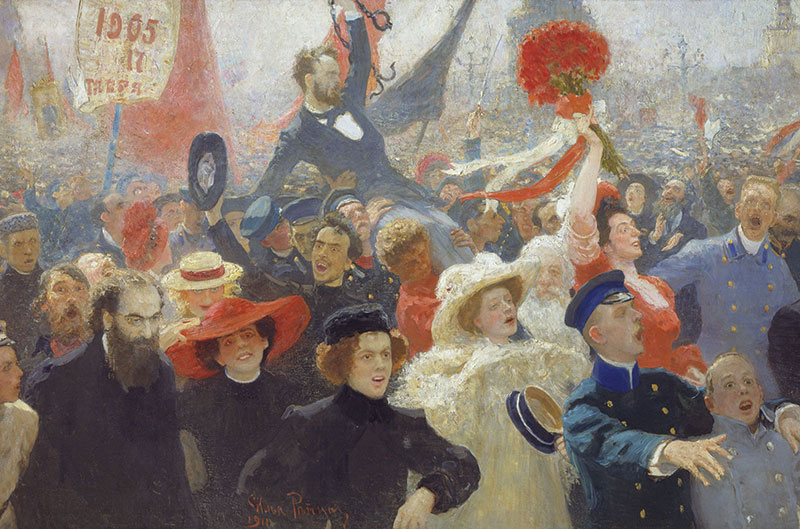In (Partial) Defense of Doublethink
To be honest, it was a relief to laugh. The previous talk at YIVO’s recent conference on “Jews In and After the 1917 Russian Revolution” had been Eli Lederhendler’s aptly titled “Lamentations: The Politics of Jewish Sustenance and Succor,” in which he recounted the pogroms and repressions of the tsarist era and the even worse pogroms of the Russian Civil War. And there was more, much more, to come: multicolored “Terrors,” assorted anti-Semitic campaigns, and mass killings and arrests.
Our laughter was, in part, at the willed blindness of Evgenia Ginzburg, one of those arrested in Stalin’s Terror and the subject of Gary Saul Morson’s talk on the dangers of “revolutionism.” Ginzburg was a loyal communist accused of “playing a double game” (a common accusation against Jews) and imprisoned in the Gulag.
Her memoir, Into the Whirlwind, finished in 1967 and smuggled out of Russia to be published abroad, is a classic of its kind, with a frustrating mixture of insight and obtuseness that seems to have been characteristic of many of those in her generation. Morson read aloud some of her unselfaware statements; for example, an epilogue in which she pledges her continuing fealty to the “great Leninist truth,” which presumably includes the sophistries persecutors used against her and millions of other innocents.
At times, Ginzburg shows tremendous insight, particularly into other inmates’ self-delusions. It’s likely that some part of her understood Lenin’s culpability in her imprisonment, and that the whole barrel of Bolshevism, rather than just a few uncomradely apples, was to blame. But another part of her did its best to guard her from this knowledge. In other words, she was practicing something like Orwellian doublethink.
Orwell, who is invoked almost superstitiously by writers grappling with Soviet history, like a statue whose nose students rub before exams, defines doublethink this way:
To know and not to know, to be conscious of complete truthfulness while telling carefully constructed lies, to hold simultaneously two opinions which cancelled out . . . and above all, to apply the same process to the process itself . . .
Thus, praising the record harvest while stomachs grumble, fervently extolling—and believing in—the beauty of Soviet justice while shivering in the Gulag on trumped-up charges.
As Morson continued to discuss Ginzburg’s memoirs and we continued to laugh, I began to feel uneasy, perhaps because of the sharp distinction he was drawing between Ginzburg’s muddled, doubled vision and our own purportedly clearer view. But I have seen doublethink in myself and in other immigrants from the former Soviet Union. Could this tendency have something to do with the defunct country we left decades ago?
As the most eager and earliest converts to the new ways, the Jewish “Old Bolsheviks” offer an extreme example of Soviet doubling of the self. As Yuri Slezkine details in his massive new chronicle of early Soviet true believers, The House of Government: A Saga of the Russian Revolution, Jewish revolutionaries often swapped out their last names for hard words like “stone” and “hammer” (Kamenev, Molotov) and clothed themselves in head-to-toe leather: a self-conscious transformation allowing them to perform the “bloody but honorable revolutionary work” that would have horrified the bookish, idealistic boys and girls they had—until recently—been. (Perhaps, as Steven Zipperstein suggested in his conference keynote address, it was precisely this promise of transformation from wordiness to action that attracted many Jews to communism.) The party names and costume changes facilitated a splitting of the self into two parts: the living human (the Jew?) who reflects, worries, and doubts, and the unfeeling instrument of party will.
The “great prophesy” had purportedly been fulfilled, yet poverty and many other social ills persisted, even grew. This was not simply a mismatch between hopes and actualities; the disconnect was between what people saw and what the state wished them to see, between what they were meant to have seen yesterday and today. In his conference talk, Samuel Kassow quoted a Leningrad friend as saying that “in this country, the hardest thing to predict is the past.” Thus, although, as Slezkine notes, stories of coming to Marxism are filled with images of enlightenment, what was needed after the revolution were eyes that were willing to close.
Who was the ideal citizen of such a world? Masha Gessen, in her incisive new book The Future Is History: How Totalitarianism Reclaimed Russia, describes a large-scale sociological study conducted in the USSR in 1987. Under the direction of sociologist Yuri Levada, this study attempted to define “Homo Sovieticus,” the human being shaped by the Soviet regime and on whom it depended. Like Ginzburg and so many others, “Homo Sovieticus” was fragmented, but both parts of his mind were shaped by Soviet government dictates. Sometimes he spouted one piece of propaganda and sometimes another, depending on which best assured his safety at the moment. Completely isolated, dependent on a government he considered his true parent, he was the perfect creature of the totalitarian state.
Despite what was for many an earnest desire to satisfy the state’s demands, an inclination to make, in Morson’s words, “a virtue out of blindness,” most Jews were simply incapable of doing so. They were too used to relying on their “good Jewish brains” (a common Russian idiom), too habituated to the outsiders’ habits of vigilant perception and difference. They could, however, create separate selves—credulous, half-blind, fully obedient—which at least met this need part-way. As several conference speakers argued, a history of trauma and an intellectual tradition of fostering paradoxes aided in the task.
These Jewish Soviets created within themselves a mental space in which to believe whatever was most convenient to the state. Within that space, they might countenance the perpetrators of violence, or even become them. Thus, Ginzburg could approve of Stalin’s wholesale “liquidation” of those peasants who owned anything at all. More extreme ideologues than Ginzburg could countenance the targeting, even, of family. Both Ginzburg and Gessen describe communist women siding with the state against their innocent husbands, disbelieving the evidence of their own experiences, even gratefully shaking hands with those who’ve come to arrest their spouses.
The most loyal believers found reasons to accept their own persecution. As Morson noted, one of Ginzburg’s fellow prisoners wrote paeans to Stalin throughout her two years of solitary confinement and recited them as the women were transported to the infamous Kolyma prison camp. Another swore his fealty to Leninism by the seven prisons to which Leninists had sent him. My personal history, and that of many other ex-Soviets, includes similar cases: My great-grandfather Lev remained a communist even throughout Stalin’s last, brutal “anti-cosmopolitan” campaign. So did his wife, even after she was widowed by his early death, which was almost certainly a result of his persecution.
In later, milder Soviet eras, milder examples of split selves were common. In the 1970s, an acquaintance of my mother’s spent a bus ride chatting excitedly with her about the wonders of America, then publicly denounced her plan to emigrate once they arrived at their destination, a Komsomol meeting. He’d assembled different parts of himself for different situations: One had grown up proudly wearing the Young Pioneers’ red kerchief, another listened to smuggled Western records.
Once we emigrated, doublethink sometimes took on a comical form. I had to quit my high-school debate team because I kept arguing for my opponents’ positions. And I spent at least one afternoon being lectured by my grandmother and her friends—an electrical engineer, a mechanical engineer, and a physicist, all used to heading teams of male subordinates—who sat me down to explain that I needed to be more subservient. The explanation was interrupted by one of their husbands, wondering whether we had seen some mayonnaise-potato salad; he was immediately shouted out of the room.
In contemporary Russia, doublethink may be facilitating the accommodations some Jews are making to the Putin regime’s gradual fostering—ably delineated by Gessen—of a totalitarian ethos. When I last visited, I was surprised to hear former dissidents speak of the need to “restore the empire.”
In fact, as Gessen’s book reports, Homo Sovieticus has proved surprisingly durable: Follow-ups to Levada’s study show a rise in public approval of Stalin in post-Soviet Russia, and a few years ago, a program on Radio Svoboda reported a similar duality among young adults, who considered Stalin a “strong leader” even as they recalled their own families’ experiences of famine, imprisonment, and execution under his rule.
In Russia, the state-run media, manufactured “youth movements,” and other propaganda tools may be prodding people toward doublethinking. But what about emigrants like my family members, who left decades ago? Why does my grandmother ignore the evidence of her own family history to voice her approval of Stalin?
There is an odd combination of political credulity and cynicism among many of my fellow ex-Soviet immigrants. One can see this coming out in our private lives, our public opinions, and in the radical disconnections that occasionally arise between them. Last spring, National Public Radio interviewed several Russian immigrants on the Brighton Beach boardwalk who continued to hail President Trump as, of all things, a bulwark against Russian incursions. Something deeper than propaganda is driving these minds—and, often, my own—in self-contradictory directions.
During much of the Soviet century, survival was foremost in most people’s minds. And doublethink was a particularly useful survival tool for Soviet Jews, who could not break themselves of the habit of thinking altogether. That may be why the habit of doublethink persisted after immigration and continues in forms ranging from the merely neurotic to the pernicious. What helps us survive will itself survive, defying time and logic.
To return to the particular case of Ginzburg’s ideology and “Leninism”: What, exactly, did they mean? During her imprisonment, not much. Whatever ideological specificity the terms held for her when she was a teacher or a student, her Leninism in prison seems purposefully vague and flexible. She uses it interchangeably with communism and pairs it with such adjectives as good, decent, true, and honest, and when she wants to remind herself, or others, that she is still a member of the human race. In fact, Ginzburg uses communist terms to denote such humanistic (and Jewish) ideals as respect for individuals and equality under the law. When another prisoner calls her “comrade,” she bursts into tears: “So I was not just Cell Number 3, north side, after all.” Her humanity—not any particular ideology—has been recognized.
Beyond a professed adherence to “the basic points of the Party line” in her memoir’s first chapters, Ginzburg never discusses Leninist or Stalinist doctrine. She even seats herself away from the ideologues on the train to Kolyma. This analytical thinker, a teacher and journalist, capable of magnificent and nuanced linguistic dissection, shies away from specificity when it comes to what is supposedly the central fact of her mental life.
Morson is correct that, strictly speaking, Leninism is responsible for all that Ginzburg suffers; as he points out, a belief in Lenin’s goodness is just as counterfactual as the Stalinism Ginzburg deplores in her “lunatic” fellow prisoners. But I do not think that actual, ideological Leninism factors much in Ginzburg’s thinking during the period she depicts. Her memoir accords to Leninism a vague and undifferentiated positivity, something like the “Supreme Good” she credits for her survival in the epilogue. I doubt Ginzburg intentionally doublethought herself into this version of Leninism. But, as I read, I marveled at its superior functionality, at all it enabled her to do and to keep of herself.
The Soviet state did its best to be all-encompassing, a Big Brother, but more, the One Father, on which all depends. This father was often erratic as a drunk, lurching from one group of supposed enemies to another, killing millions on impulse. By the time of Ginzburg’s arrest, it was clear that no group, and certainly no individual, was free from fear of sudden displacement, imprisonment, and murder. Once marked for punishment, there was no protecting oneself, as Ginzburg sees with a “merciless clarity of vision” after her final interrogation in Moscow.
What would it be like to live, knowingly, under the complete control of chaotic evil? As a matter of psychic survival, many people could not. Writer Lidiya Chukovskaya, whose husband was murdered during Stalin’s Terror, wrote:
The regime had attacked its citizens for no imaginable reason and was beating them, torturing them, and executing them. How were we to understand the reason for such whimsy? If you let it sink in that that there is no reason . . . then your heart, though no bullet has pierced it, will be torn apart, and your mind, in its intact shell of a head, will grow shaky.
As Anne Frank wrote in her underquoted postscript to the famous line about believing people good at heart: “It’s utterly impossible for me to build my life on a foundation of chaos, suffering, and death.” Some belief in an overarching good is necessary for survival. So, people denied the evidence of their eyes and forced themselves to believe in the state’s benevolence, seeking safety in childlike loyalty.
Credulousness was also tied with a childlike seeking of approval from the parent-state. The more extreme the belief the state demanded, the greater the loyalty of the believer, and the more worthy the believer might become. Perhaps that is part of the reason why Ginzburg and her cellmate Julia are so nostalgic for their childhoods, when belief was more easily achievable. “You and Pavochka are a trusting pair . . . with the mentality of grown-up children,” Ginzburg’s bunkmate Tanya comments, when Ginzburg wonders about a hospital car on their prison train. Meanwhile, other prisoners are praising and poetizing Stalin. As this scene suggests, within that narrow band of childlike loyalty demanded by the state, there were two apparently similar but fateful options:
Stalinism—the more popular and ideologically “correct” position of the 1930s—and Leninism.
Counterintuitively, Ginzburg’s Leninism was the better choice when it came to survival because—in contrast to Stalinism—it was not in danger of dissipation upon contact with reality. Imagining that particular authorities are benevolent can lead one into dangerous attempts to invoke that benevolence—for example, via a personal audience with Stalin, which Ginzburg turned down. Stalinism also included a belief in the rightness of his policies; how to hold onto such belief as one beheld the torture of innocents, or oneself? There are limits to even the most practiced doublethink.

Ginzburg sidesteps this trap by emphasizing the “ism” in her Leninism, creating a mental construct so vague it can neither be proven nor disproven, and thus, ironically, represents a sturdy, flexible, abstract, yet still ideologically permissible idea of the Soviet good that is not dissimilar to certain Jewish conceptions of God. An ideal outside of lived experience has a greater chance of enduring the horrors of real life. In a further twist of restorative doublethink, she fans her own fantasy of salvation with a poem invoking Jewish traditions and promising, “Next Year in Jerusalem!” Never mind communism’s demands for strict atheism; she draws on whatever spiritual resources she has to doublethink her way through another prison year.
In the afterword to her memoir, Ginzburg declares her fantasy of rescue has been realized: “All that this book describes is over and done,” she begins; after all, she and a few others have lived to see Stalin denounced during the Khrushchev thaw. She describes the era of her memoir as “the time of the cult of personality” in Russia—as if there are not other cults, as if she didn’t herself, as Morson points out—support the cult of Lenin.
The idea that all iniquity is in the past, the willed belief in a bright present and ever-brighter future, helps her bat away regrets, as well as such questions as why the Supreme Good ensured her survival but not her friends’ (whose deaths she movingly depicts). Toward the end of his presentation, Morson read aloud Ginzburg’s summing-up of her thoughts on the Bolsheviks: “All I had—the thousands of books I had read, the memories of my youth . . . I owe to the revolution.”
Morson asked, “Does she really think she could not have read those books under the Mensheviks?” Perhaps she couldn’t allow herself to imagine that; not every imagined possibility is survivable. Similarly, to hear the phrase “Evil Empire” in the 1990s, one had only to ask a Soviet immigrant if he had any regrets about leaving: A fiercely anti-nostalgic reaction staved off wonderings about what might have been, had we stayed.
Ginzburg’s doublethink also helps her retain a capacity to love. Her counterperceptual belief in a guiding force for good allows her to believe in the goodness of others. She pours love into whatever vessels are available, whether “worthy” or not, and, most often, she has neither time nor inclination to delve into the question of worthiness. She thinks kindly of, and smiles affectionately at, the young guards at her sentencing (“What nice faces”); she wonders how she will ever be able to live without the company of a woman doctor she briefly meets in a prison shower; she and her cellmate Julia become like sisters. She keeps in practice with the human emotions of affection and trust, even though she finds herself trapped in the era when “the prisoner’s destruction became the object of the operation.”
After prison, Ginzburg remarried another former prisoner and adopted an orphan girl. Her belief in an ultimate benevolence, driven as it was by doublethink, allowed her to build a family, despite the horrifying knowledge that her former family had been scattered and her eldest son had died of starvation. Her enduring capacity for love and trust extends to us, her readers. She believes we will understand her story, that we will emphasize with her (like the guard to whom she cried about her innocence early in her arrest, and who, against all odds, offered reassurance and care).
When we discuss the Soviet era, people in my family will sometimes say, “It could have been worse.” This refrain has in it some self-protective doublethink, but, also, I believe, some truth. We could have been worse. We ought not conflate Ginzburg’s doubling with erasure of the self; we ought not to consider this distinction purely semantic.
Early in the memoir, when the Terror is just beginning, Ginzburg’s mother-in-law says, “It’s happened before,” recalling to Ginzburg King Solomon’s words, “This too shall pass.” Is Ginzburg willfully mishearing, doublethinking her way to some hope? Or, has she understood correctly?
Yes, she believed in “Leninism”: She could not bring herself to let go of the only permitted source of belief in benevolence. But she still produced a record that includes a great deal of truth. As Morson pointed out, a doubled conscience destroys one’s integrity. But it also leaves an honest part of the soul intact. That is why Ginzburg was able to witness and lament the blindness of her fellow prisoners even as she suffered from the same affliction. Ginzburg lived to tell her tale, leaving it to others to learn from it and, perhaps, to judge.
Suggested Reading
Babel’s Transcendent Mistakes
When I was 12, my parents bought me a gigantic Yiddish-Russian dictionary. Maybe this was their way of compensating for the fact that they had not told me I was Jewish until second grade, when I came home singing a Ukrainian ditty with the word “zhid.”
Dangerous Liaisons: Modern Scholars and Medieval Relations Between Jews and Christians
In the spring of 1942—which, as Mel Brooks noted, was “winter for Poland and France”—Salo Baron published a boldly revisionist article. He was thinking of present-day Europe, a 12th-century Jewish woman named Polcelina, and perhaps also his colleagues.

Denial and the Defense of Truth
Denial is more than a slick courtroom drama about Holocaust denial; it is also a defense of objective truth against nihilistic relativism, a call to arms by the establishment against self-proclaimed outsiders who deny all sorts of truths.

On Not Bringing Up Baby
What happens when the rising cost of raising children meets the downward pressure on reproduction?


Comments
You must log in to comment Log In